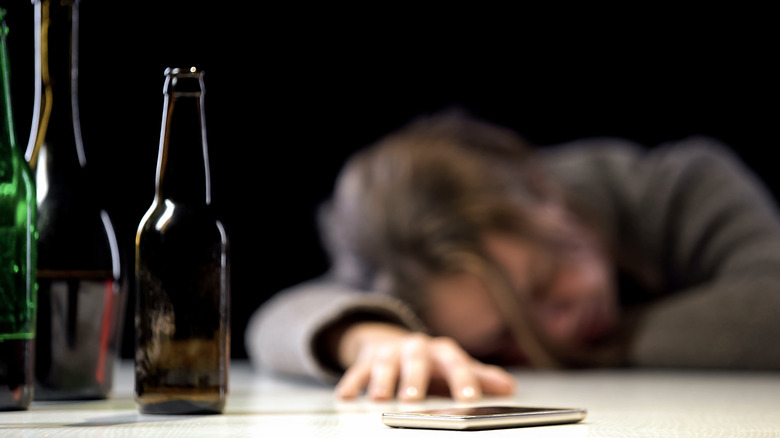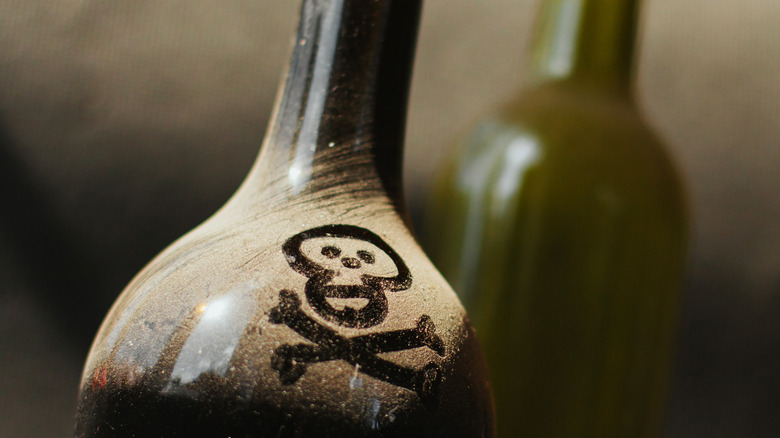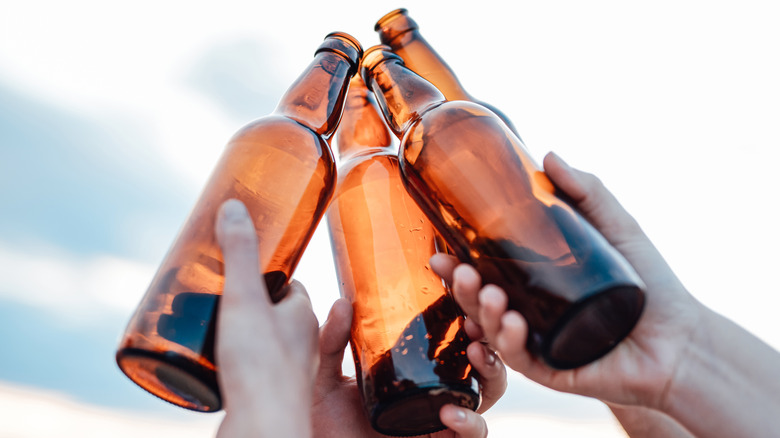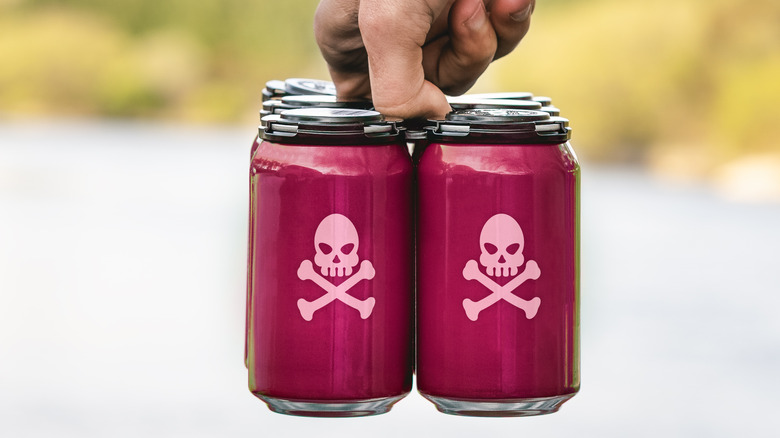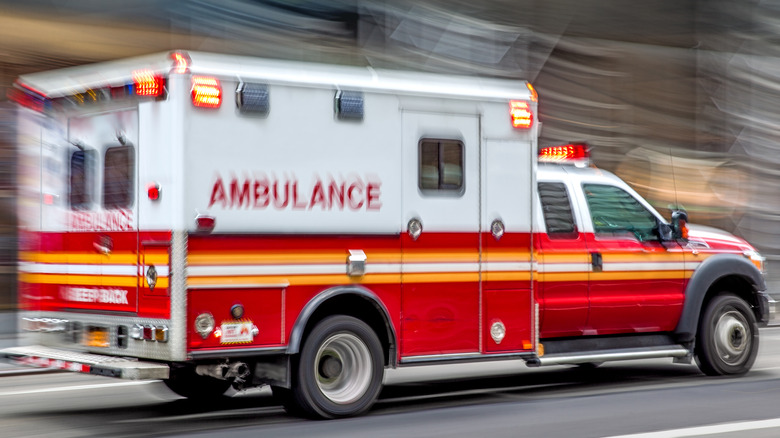Alcohol Poisoning Explained: Causes, Symptoms, And Treatments
According to the National Institute on Alcohol Abuse and Alcoholism, while alcohol abuse has serious detrimental health effects, alcohol poisoning is not like heavy or binge drinking. Heavy drinking refers to consuming more than 14 drinks per week for men, and more than 7 drinks per week for women. Meanwhile, binge drinking refers to consuming more than 5 and 4 drinks for men and women, respectively, within a two-hour period. This would bring their blood alcohol concentration to 0.08 grams per deciliter (g/dL) or higher, the maximum allowed for driving in the U.S.
In contrast, alcohol poisoning is a severe consequence of drinking too much alcohol in a short period of time. Thus, alcohol poisoning can be classified as a type of alcohol misuse, which entails consuming alcohol in a way or quantity or at a rate that has the potential to harm yourself or others. In fact, generally speaking, alcohol ranks as the fourth-leading cause of preventable deaths in the U.S., right behind tobacco use, unhealthy eating and sedentary lifestyle, and illicit drug use.
However, the Centers for Disease Control and Prevention declares that alcohol poisoning is such a life-threatening condition that it leads to more than 2,000 deaths per year in the U.S., most of which happen to White, non-Hispanic men between 35 and 64 years old. This article reviews alcohol poisoning, including its causes, symptoms to look out for, available treatments, and what to do if someone you know has alcohol poisoning.
If you or anyone you know needs help with addiction issues, help is available. Visit the Substance Abuse and Mental Health Services Administration website or contact SAMHSA's National Helpline at 1-800-662-HELP (4357).
What is alcohol poisoning?
Alcohol poisoning is a potentially lethal condition that happens when you drink more alcohol than your body can manage, which leads to high blood alcohol concentrations that have the capacity to shut down areas of your brain that oversee essential life functions, the National Institute on Alcohol Abuse and Alcoholism (NIAAA) explains. This means that when you're under the influence of such high alcohol levels, you may have trouble breathing, your heart rate may reach a dangerously slow rhythm, and you may experience extremely low body temperature or hypothermia, which makes it hard for your organs to work normally (per the Mayo Clinic).
While many may associate alcohol poisoning with people who have alcohol dependence, in 2015, the Centers for Disease Control and Prevention published a report explaining that while alcohol dependence contributed to about 30% of alcohol poisoning-related deaths, the majority of people who drink excessively or to the point of reaching alcohol poisoning are not alcohol dependent. In fact, per the NIAAA, it can happen to anyone who enjoys a few drinks too many while celebrating with family and friends.
Furthermore, alcoholic beverages are not the only way someone can get alcohol poisoning. According to Healthline, people (especially children) can also get alcohol poisoning from drinking isopropyl alcohol (also known as isopropanol or ISO). Unlike ethanol (the type in alcoholic drinks and liquors), ISO is a toxic chemical commonly found in rubbing alcohol or cleaning products that can also have deadly effects if ingested.
Causes of alcohol poisoning
Alcohol poisoning can be caused by consuming large amounts of either beverage ethanol or non-beverage ethanol (a.k.a. alcoholic drinks or alcohol from medicines or cleaning supplies), per StatPearls. Once alcohol enters your body, it is metabolized in the liver by an enzyme called alcohol dehydrogenase. However, your liver can't metabolize it fast enough when it is consumed in excess, which leads to alcohol binding to a group of receptors that inhibit your central nervous system, resulting in decreased coordination, impairment of your mental abilities, and ultimately, the potentially life-threatening symptoms.
According to a study published in the American Journal of Preventive Medicine, binge drinking is one way of reaching such high blood alcohol levels. More specifically, this refers to binging thrice the binge threshold — the equivalent of men consuming more than 15 drinks and women drinking more than 12 alcoholic beverages over 2 hours — in which case the chances of blackout increase by 50%. In fact, the National Institute on Alcohol Abuse and Alcoholism says that those who reach or surpass that threshold are 93 times more likely to end up in the emergency department due to excessive alcohol intake and its associated health consequences.
Symptoms of alcohol poisoning
The symptoms of alcohol poisoning can range from moderate to severe. Yet, you should still seek medical attention even if you don't think they're that bad. According to the NHS, alcohol poisoning symptoms include confusion or disorientation, which can be evidenced when someone has trouble thinking clearly or answering simple questions. They also include slurred speech or having difficulty pronouncing words, vomiting, having a hard time standing or walking, and losing control of your bladder and bowel muscles, which leads to the uncomfortable experience of peeing or pooing yourself, respectively.
In addition, some of the more severe symptoms include having a slow or irregular breathing (which can be life-threatening), seizures or convulsions, having blue-tinged skin or lips or pale skin, which happens when your body is not getting enough oxygen (check the inside of the lips, gums, or under the fingernails in people with dark-colored skin), and lastly, unconsciousness. Plus, the National Library of Medicine includes memory loss, double vision or rapid involuntary eye movement, and hypothermia to the list and explains that alcohol poisoning symptoms depend on the blood alcohol concentration (BAC), with higher BAC leading to more serious symptoms (via StatPearls).
It has negative effects on your health
According to the College Drinking Prevention website of the National Institute on Alcohol Abuse and Alcoholism (NIAAA), drinking too much alcohol at once can affect your brain, heart, liver, pancreas, lungs, stomach, kidneys, and immune system. Alcohol intoxication can alter brain cells or neurons, causing them to shrink, leading to memory, sleep, and mood problems. Regarding your heart, its negative effects include an increased risk of stroke, high blood pressure, irregular heartbeat, and even cardiomyopathy (a condition in which the heart can't effectively pump blood, which leads to your organs receiving too little oxygen). As for your liver, it is the organ in charge of processing alcohol. Yet, the byproduct of alcohol metabolism can damage liver cells, increasing the risk of liver diseases like alcoholic hepatitis, cirrhosis, and liver failure.
Moreover, alcohol poisoning can be harmful to your pancreas by causing an accumulation of digestive enzymes within it. While the pancreas produces these enzymes, they are meant to be released into your small intestine to digest foods, but by remaining in the pancreas, they cause inflammation, which can lead to acute pancreatitis. Regarding your lungs, harmful effects include an increased risk of breathing in foreign materials, which also increases the risk of developing alcohol-associated lung disease. As for your stomach and kidneys, even a single binging episode can cause gut leakage and electrolyte imbalances, respectively. Lastly, it affects your immune system by causing an inability to fight off infections (per the NIAAA).
Risk factors for getting alcohol poisoning
There are several risk factors that can increase your chances of getting alcohol poisoning, most of which can be divided into general or individual. According to the Mayo Clinic, some of them include how much alcohol you've ingested, how fast you consumed it, your drink's alcohol percentage (the amount of alcohol per the volume of liquid), and whether you drank on an empty stomach or mixed it with other drugs, which can be classified as general factors.
In contrast, factors that can be categorized as individual include your body weight and size (with smaller people being more susceptible to alcohol poisoning), your health status or the presence of pre-existing health conditions, and your alcohol tolerance levels, which the National Library of Medicine (NIH) defines as needing higher amounts of alcohol to feel its inhibitory effects. In addition, the NIH includes female gender and cigarette use as factors that can increase the likelihood of reaching dangerously high blood alcohol concentrations.
Moreover, the National Institute on Alcohol Abuse and Alcoholism explains that teenagers and young adults (such as college students) have a greater risk of getting alcohol poisoning because they tend to engage in binge-drinking behaviors more often. Per a 2018 study published in the journal Alcohol Research, factors that increase the chances of heavy drinking (and thus alcohol poisoning) in college students include moving out of their homes and into a college campus, less parental supervision, and peer pressure or joining a fraternity or sorority.
Consequences of alcohol poisoning
Alcohol poisoning can have serious consequences for you and your loved ones. According to the Centers for Disease Control and Prevention (CDC), potential short-term consequences of drinking too much in a short period of time include increased risk of injuries caused by falls or car or motorcycle accidents, drowning, and being a victim of violence, sexual assault, or sexual behaviors that can lead to unplanned pregnancies or sexually transmitted diseases (STIs).
In addition, pregnant people who get alcohol poisoning may miscarry, have stillbirths, or deliver babies with fetal alcohol spectrum disorders. Moreover, alcohol poisoning can increase the risk of alcohol use disorders and even the development of some types of cancers in the long term. Per the CDC, this happens because byproducts of alcohol metabolism can cause irreparable damage to your DNA, increasing the risk of cancers such as larynx, throat, mouth, esophagus, liver, colon, and rectum cancers, as well as breast cancer in women.
Lastly, since the high blood alcohol concentrations that lead to alcohol poisoning can shut down areas of the brain that support basic life functions, the CDC also warns about alcohol poisoning deaths, which take an average of six lives per year in the United States.
Alcohol poisoning treatment
Treatment for alcohol poisoning is provided by medical professionals in a hospital setting, and it involves several efforts that aim to monitor your vital signs, including heart rate, blood pressure, and breathing, as well as counteract alcohol's harmful effects on the body. For starters, according to the Cleveland Clinic, healthcare providers will first treat dehydration and prevent electrolyte imbalances by giving intravenous fluids. In addition, they might provide oxygen therapy with a nasal cannula or a tube that goes down your windpipe to protect the airway and prevent respiratory depression. Furthermore, some cases might require the need to perform gastric lavage or stomach pumping to remove any remaining alcohol in the stomach and keep it from being absorbed. Lastly, they may help your kidneys get rid of the alcohol in your bloodstream by starting a blood-filtering process called dialysis (when a machine does the filtering instead of your kidneys).
Moreover, per Healthline, some additional acute treatment practices include providing vitamins and glucose to prevent hypoglycemia or low blood sugar levels. Also, since alcohol poisoning leads to loss of bladder muscle control, doctors may drain your urine into a bag via a catheter to keep you from peeing yourself. Finally, you may receive activated charcoal, which also helps reduce alcohol absorption.
How to prevent alcohol poisoning
Alcohol poisoning is potentially lethal, but it can be prevented by following a few simple recommendations (per the Mayo Clinic). First, it helps to avoid drinking alcohol at all. If you decide to do so, drink slowly and in moderation, which translates to a single drink per day for women and two drinks per day for men. For reference, one standard drink is the equivalent of a 12-fl-ounce beer, a 5-fl-ounce serving of wine, or a 1.5-fl-ounce serving of a typical shot of any distilled spirit (via the 2020-2025 Dietary Guidelines for Americans).
In addition, you should avoid drinking on an empty stomach, as food may help reduce alcohol absorption. However, it won't prevent alcohol poisoning if you still binge drink. Also, the Cleveland Clinic suggests alternating alcoholic drinks with water or other non-alcoholic beverages to prevent dehydration and poisoning, as well as avoiding drinking while on prescription medications. Note that to enjoy alcohol in a safe and responsible manner, you should be aware of your limits and stop drinking before you reach the point of intoxication.
Furthermore, parents are advised to keep a close relationship with their teenage and young-adult children when they move out and talk to them about the harmful effects of binge drinking, as it is believed to reduce the likelihood of them drinking excessively. Also, for parents of younger kids, recommendations include storing alcoholic beverages and other alcohol-containing household products safely to avoid accidental ingestions of toxic substances.
What to do if someone has alcohol poisoning
If you suspect that someone has alcohol poisoning, it's essential to seek medical attention immediately, as prompt treatment can help to prevent serious complications and save lives. Some steps you can take to help someone with alcohol poisoning include calling your local emergency services and being prepared to provide as many details as you can about the person's symptoms and condition, such as their weight, age, and number, type, and amount of alcoholic beverages consumed, as explained by MedlinePlus. The site also recommends staying with the person to make sure they don't fall, choke, or hurt themselves.
Additionally, the National Institute on Alcohol Abuse and Alcoholism suggests keeping the person in an upright position on the ground instead of sitting in a chair or lying in a bed. But, if they happen to be lying down and they start throwing up, be sure to roll them to the side to keep them from choking. Similarly, help them lean forward if they're sick while seated. Lastly, the NHS instructs to keep the person warm by covering them with a blanket or sweater to prevent hypothermia or extremely low body temperature.
Ultimately, remember that any additional information you can provide can make a huge difference in the outcome. So, be honest with medical professionals if the person has consumed other substances besides alcohol, and tell them what substances were consumed, as this can affect the course of treatment.
Some myths about alcohol poisoning can put you in danger
Despite what you may have heard from family and friends, there are a couple of myths or so-called solutions that claim to help reverse alcohol poisoning or, at the very least, speed up the sobering process. However, there are no homemade cures or treatments for alcohol poisoning, and following these alleged bits of advice can actually make things worse. One of the most common myths is that a cup of coffee will sober you up. However, per the NHS, caffeine can actually lead to higher dehydration levels in people with alcohol poisoning.
Similarly, the NHS debunks the myth that a cold shower or bath helps get the job done by explaining that it can actually increase the risk of hypothermia or extremely low body temperature characteristic of excessive alcohol intake. Furthermore, a shower also significantly increases the risk of injury and drowning if the person falls or loses consciousness while in the water. If you need to help someone with alcohol poisoning, the best thing to do is to contact your local emergency services.

